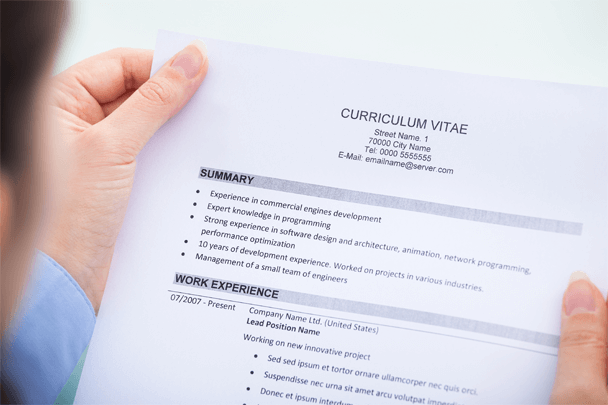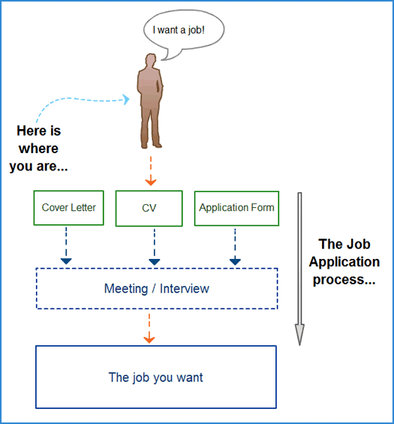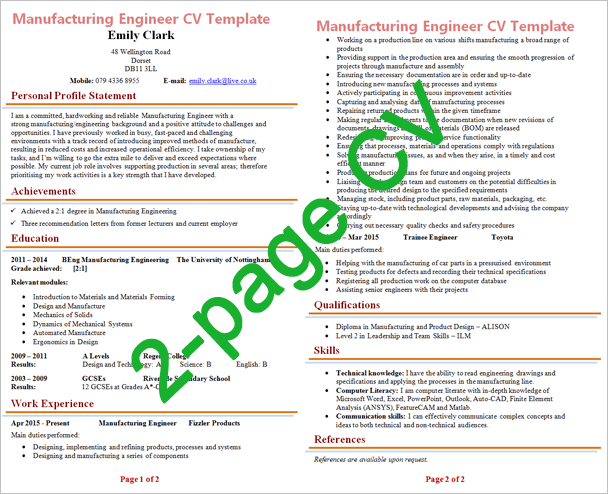 Sobhan Mohmand, Career Expert
Sobhan Mohmand, Career Expert  1 Jan 2024
1 Jan 2024
It may be that you’re looking to apply for a job and the employer has asked you to submit a CV as part of the application process. You may be wondering,
“What is a CV and how do I write one?”
A CV is a document that stands for ‘Curriculum Vitae’ which is the Latin expression for “the course of one’s life”. Your CV is your personal marketing tool showcasing your qualifications, work experience, personal qualities and skills to potential employers to secure a face-to-face interview for a job.
CVs are mainly used by applicants in Europe and Asia to apply for jobs. In the United States and Canada, applicants use a résumé (pronounced ‘rez-ume-ay’) to apply for jobs. It’s a French word meaning ‘summary’.

Your CV and cover letter are the first contact you have with an employer when applying for a job and may receive just 30 seconds of their time on the first reading. Ensure that your CV contains the right information, in the right order and in a form that is easy to read.
A good CV will boost your chances of being interviewed and securing the jobs of your dreams.
Your CV is not only the first thing the potential employer sees about you; more importantly, it is the only part of the whole job selection process over which you have 100% control.
Use the guide below to find out more about CVs, how to write one from scratch and get expert CV tips and advice to secure more job interviews.
Let’s begin!
The simplest definition of a Curriculum Vitae is that is ‘a document containing a summary of one’s academic and work history.’
The Oxford Dictionary defines Curriculum Vitae as “a brief account of a person’s education, qualifications, and previous occupations, typically sent with a job application.”
It is pronounced, “kuh-ri-kyoo-luhm-vee-tai.”
The Latin meaning of Curriculum Vitae is “the course of one’s life” but this can be misleading as a CV is not an autobiography full of personal details; it is a short document that only contains details about your skills, academic achievements and work history.
The most common use of a CV is in the process of applying for a job.
There are two ways to use your CV to apply for jobs:
Some people mistakenly believe that the purpose of their CV is to get them a job.
This is not the case!
No employer will call you and say,
Unfortunately, it doesn’t work like that in the real world.
The ultimate purpose of a CV is to get you to the next stage of the recruitment process, this may be an informal meeting, a telephone interview or a formal face-to-face job interview.
Once this has been accomplished, it is over to you at the interview to bring the words on the CV to life, impress the employer and secure the job that you want.

We live in a world of competition. The job market, in particular, is getting more and more competitive. There are millions of people looking for jobs at any given time and limited vacancies to meet demand. When employers advertise vacancies, hundreds of applicants will be applying for the same job so it’s essential that you have an effective CV to stand out from the crowd.
Martin Yate, a best-selling careers author, states in his book The Ultimate CV Book (Pg.3):
Don’t underestimate the value of your CV; it is one of the most important documents in your possession. It can open the gates of employment to you faster than any other document could.
Employers receive hundreds of applications for each job opening. Recruiters will, on average, spend less than 30 seconds reading a CV. Your job is to make the most out of this tiny window of opportunity and sell yourself to the recruiter.
Research has shown that the most effective CVs are the ones that are short and to the point.
The general rule is that your CV should not be longer than two A4 pages. Young people, school leavers, college students and those applying for their first job should opt for a one-page CV. Most other applicants, including university graduates, executives and managers, can adopt a two-page CV. Only specialist, academic, scientific and medical CVs can be longer than two pages.
Related: How Long Should a CV Be? (The Definitive Guide – 2023)
The following is a good example of how a standard CV should look like:

Features of a good CV:
Related: Example of a great CV.
The following is the information that a typical CV will include:
The following is a list of things you should never put on a CV:
Below is an example of a typical CV template that you can use to help you write and organise the content on your CV:
[Achievements]
(A list of your achievements)
[Education]
(Name of school, college or university)
(Dates you attended)
(The qualification you achieved)
(Grade achieved)
(Brief description of key modules or units studied)
[Work experience or employment history]
(Name of the company)
(Start and end dates)
(Job title)
(Brief description of your key duties, responsibilities and achievements)
[Professional qualifications]
(Details of any work-based, professional qualifications)
[Key skills/competencies]
(A list of your key skills that closely match the job requirements)
[Hobbies and interests]
(A brief description of your hobbies and interests that are relevant to the job and could add value to your application)
[References]
(Details of two referees that can vouch for you to the employer. Alternatively, “References are available upon request” will suffice)
Related: Download free CV templates in Word format.
The content of your CV needs to be prepared with meticulous attention to detail. Set aside plenty of time to write and edit your CV for maximum effect. Use the step-by-step guide below to help you write your perfect CV:
The top of your CV is dedicated to your personal details that include your name, address, telephone number and email address. Make your name the main heading of your CV, written in big, bold letters and centred on the page.
It’s optional to include a link to your LinkedIn profile or personal portfolio.
Related: A guide to writing personal details on a CV.
A personal profile statement is the opening statement of your CV.
It is a brief summary of your personal characteristics, abilities and experience.
It is designed to introduce you as a person, create a good first impression and encourage the employer to continue reading your CV.
Guidelines:
Related: Best personal profile examples for all jobs.
Next, list a few of your achievements or accomplishments that show you in a good light.
You can use examples from both your personal and professional life.
Your achievements are a testimony of your skills, abilities and commitment to succeed in everything you do so employers are much more likely to invite you for an interview if they perceive you to be an achiever rather than just a doer.
Examples of achievements include awards, promotions, pay rises, etc.
Related: Examples of best achievements to put on a CV.
There are a wide range of formal qualifications you can mention in this section; school-level qualifications such as GCSEs, college-level qualifications such as A-Levels and university-level qualifications such as undergraduate and postgraduate degrees.
For each entry, you must state the start and end dates, course name, institution name and grade achieved. It’s also recommended to list a number of relevant modules that you studied, giving the employer a fuller picture of what you have learned.
Related: A complete guide to writing your education on your CV.
This is the most important part of your CV. You can list various types of jobs in this section, including full-time jobs, part-time jobs, voluntary positions and internships. For each entry, you must state the start and end dates of the employment, company name, your job title and your key duties, responsibilities and achievements.
Related: Employment history on a CV (complete guide + examples).
This section is dedicated to any vocational, work-based and professional training qualifications that you may have. If you don’t have any of these qualifications, don’t worry, just skip this section.
Next, list some of your key skills, talents and abilities as they relate to the job. Examples of skills that you can include in this section include communication skills, computing skills and organisational skills. Make sure you include a mixture of both soft and hard skills.
Related: 50+ best examples of CV skills to put on your CV.
You can add great value to your CV by including a few of your hobbies and interests that are relevant to the job. For example, stating that you participate in charity events demonstrates that you have excellent interpersonal skills, which is an essential requirement for many jobs that require working with people.
Related: BEST Examples of Hobbies and Interests to put on a CV.
The last part of your CV is the references section, where you are expected to provide details of two referees who can vouch for you to the employer.
One of them has to be your current or former employer, the other can be someone like your teacher, tutor, personal trainer, etc.
Alternatively, you can also write, “References are available upon request” if you do not wish to disclose your references this early in the recruitment process.
Related: Should you include references on your CV? (Guide + Examples)
There are several formats in which you can write your CV, depending on your personal circumstances and preference. The following are the three main types of CVs:
The chronological CV is the most common format used and favoured by recruiters. It lists the candidate’s information in reverse chronological order (i.e. starting with the most recent job and working back to the oldest job).
This format ties the applicant’s job responsibilities and achievements to specific employers, job titles and dates. The CV will demonstrate a clear record of career progression from the first job up to today.
Advantages
Disadvantages
Who should use the chronological CV format?
Corinne Mills, a well-known career expert and HR executive, writes in You’re Hired, how to Write a Brilliant CV (pg.100): “Employers like them because they can see what your work history and career progression has been. They can also see any career breaks, the length of each employment and any changes in career path.”
The functional CV highlights your key skills, combining your experience or achievements from various jobs regardless of when they occurred. It uses dedicated section headings such as ‘Key skills’ or ‘Achievements’.
For example, you may have done a small amount of account handling in four different jobs in the past; the functional CV allows you to combine all the skills and experience of these different jobs into one section of your CV.
Contrary to a chronological CV, this CV style de-emphasises employers and employment dates. It mainly focuses on the transferable skills and experiences gained, without too much focus on when, where and how they were acquired.
Advantages
Disadvantages
Who should use the functional CV format?
This type is also known as the ‘Combined CV’. It retains much of the fixed order of the chronological CV but there is a lot more emphasis on skills and achievements. This format aims to take the best elements of the chronological and functional CVs so can be quite lengthy.
The best CV format is the chronological CV that lists your jobs starting from your current or most recent job and going back to your first job. Recruiters prefer it for its logical, easy-to-follow layout and improved readability. Research has shown that chronological CVs, in general, are better at outperforming functional CVs in winning job interviews.
Unless there is a specific reason why you would adopt a functional CV format, the chronological CV format is the preferred choice for all applicants.
Imagine you’re the employer for a moment.
You have 120 CVs on your desk and you have to choose only a handful of applicants to invite to an interview. The first thing you will probably do is to reject/bin all the bad CVs to reduce the pile. That’s exactly what recruiters do, too.
Bad formatting, unclear section headings, spelling mistakes, lack of focus and too much irrelevant information are some of the main reasons why CVs are rejected so quickly.
Get the basics right and the employers will keep reading!
Your CV needs to be a selling document, well laid out, succinct and easy to understand.
Use the following formatting tips to make your CV stand out from the crowd:
Don’t send your CV by post as it will most likely get lost, misplaced or ignored. Send it via email to the appropriate person (i.e. hiring manager) or upload it on their website/system – refer to the job description or advert for the exact instructions.
Employers prefer to receive CVs by email because they can locate, open and review CVs within seconds without having to worry about going through piles of printed CVs.
Note: Even though it’s e-mail, you’re still making a formal application so avoid using informal/slang language, abbreviations and smiley faces!
Related: How to email a CV.
A Curriculum Vitae (abbreviated to CV) is a document that you use to apply for jobs. It contains important information about your educational qualifications, employment history, personal qualities and professional skills.
Employers will use your CV, along with your job application form and cover letter, to decide on your suitability for the job and whether to invite you for a job interview.
When writing a CV, it’s important to ensure that you’re producing a selling document; adopt a conventional CV format, only include relevant information and present it in an easy-to-follow way without any spelling, grammar or formatting mistakes.
Good luck with your job search!